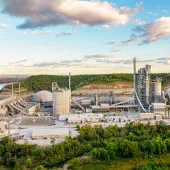Heidelberg Materials invest €65 million in France
Production of calcined clay at Bussac-Forêt to allow launch of new range of low-carbon cements
AS part of yesterday’s Choose France summit, Heidelberg Materials announced the investment of €65 million to accelerate the decarbonization of their Bussac-Forêt cement plant in the west of France. The plant will be expanded to include a facility to produce calcined clay, which can replace parts of the CO2-intensive clinker in the cement. This will allow the launch of a new range of low-carbon calcined clay cements containing less clinker.
‘Our most recent investment in innovative technologies in France demonstrates Heidelberg Materials’ strong commitment to decarbonize our products. The launch of the transformative project in Bussac-Forêt will be supported by a favourable administrative and regulatory environment,’ said Dr Dominik von Achten, chairman of the managing board of Heidelberg Materials. ‘The project will reduce the site’s CO2 emissions by up to 20% and thus have a significant positive impact on Heidelberg Materials’ carbon footprint in France.’
Dr Nicola Kimm, chief sustainability officer and member of the managing board, added: ‘In Bussac-Forêt, we are investing in a technology with great potential. It will allow us to significantly expand the range of low-carbon products. Using calcined clay as clinker substitute is an important measure to reduce the carbon footprint of cement and concrete. In principle, a CO2 reduction of up to 40% is possible when substituting cement clinker with calcined clay.’
The company is currently piloting calcined clay technology in Ghana, where the world’s largest flash calciner is currently being built with a capacity of more than 400,000 tonnes per year.
This latest investment is in addition to the €46 million already committed by Heidelberg Materials to decarbonize the Bussac-Forêt cement plant by increasing the alternative fuel rate from 30% to 80%. The project is financially supported by the Ecological Transition Agency as part of the France Recovery programme, and benefits from support from the Nouvelle-Aquitaine region. It is fully in line with Heidelberg Materials’ climate strategy, which has set targets to reduce specific net CO2 emissions per tonne of cement by 47% by 2030 compared to 1990. The Group aims to achieve net zero carbon emissions by 2050 at the latest.










